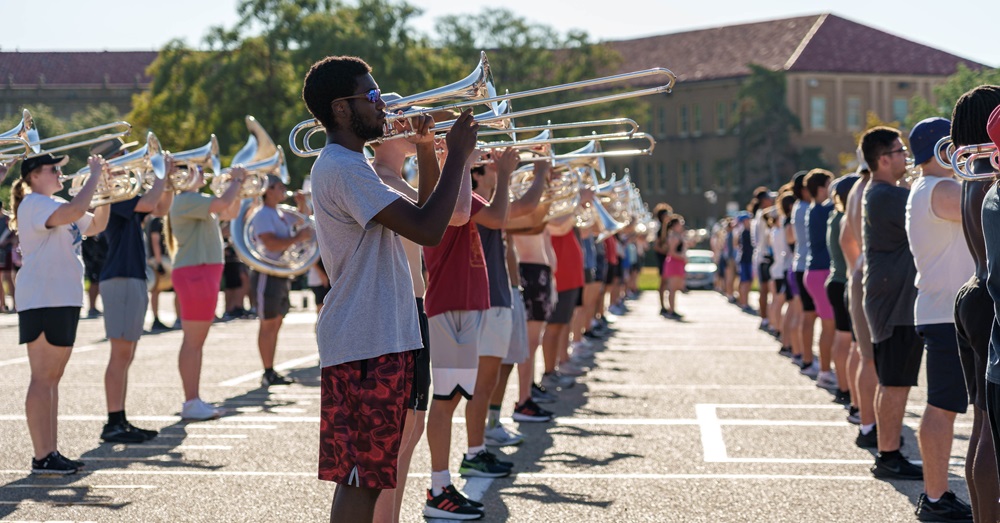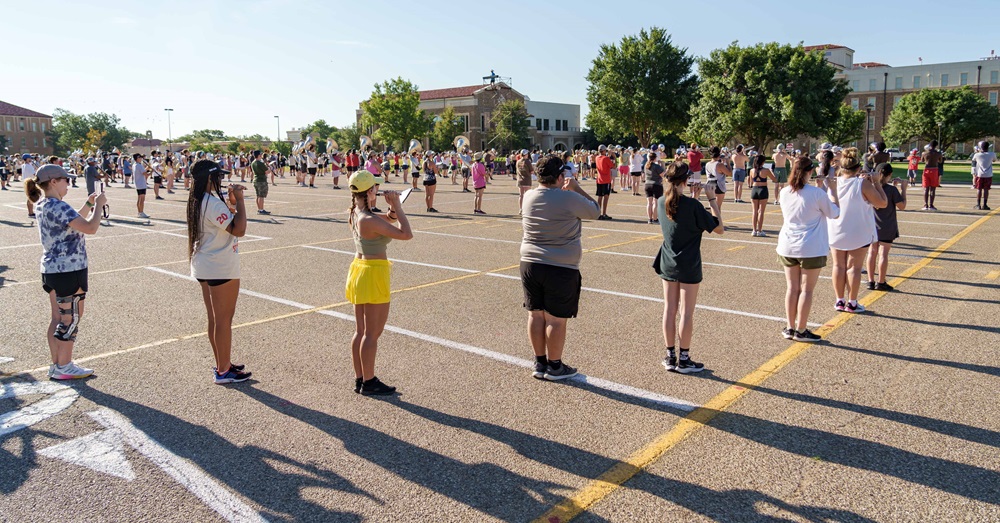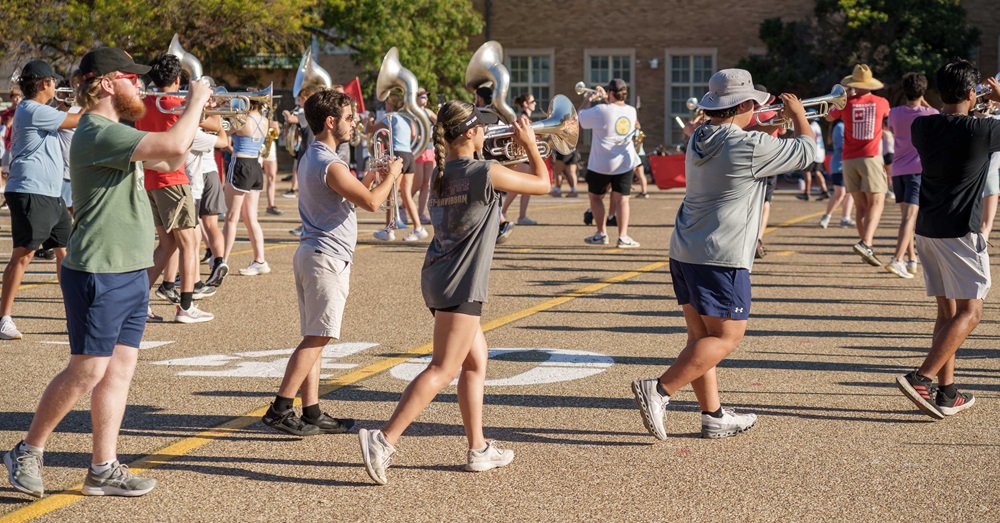Marching Through the Heat: College Band Members Tackle Physical Challenges
Endurance, Preparation Key to Preventing Injuries

College football season is underway, but another group of top performers is hitting the field too: band members. Just like college athletes, marching band members face a rigorous schedule of rehearsals and performances under the hot Texas sun. These musicians also endure physical strain which could pose a significant risk of injuries if proper precautions aren’t taken.

David S. Edwards, M.D.
“Marching band members qualify under the broad category of marching performers, and they tend to have overuse injuries, particularly in the lower extremities,” David S. Edwards, M.D., Texas Tech Physicians sports medicine physician, said. “These include foot and ankle injuries, shin splints, hip tendonitis and even back problems. Lumbar sprains and strains can all be problems for the marching performing athlete.”
In addition to overuse injuries, band members need to be mindful of practicing and performing in the heat. Members of the Texas Tech University Goin’ Band from Raiderland start rehearsals a week before the fall semester begins. This year, that meant hitting the parking lot at 7:15 a.m. in the middle of an unusually humid August and continuing through 9 p.m. when the temperature was above 90 degrees Fahrenheit.
“Because we’re in Texas, it does take a toll on the students, but this is something that we condition and prepare for throughout the season,” Joel Pagán, Ph.D., director of Athletic Bands, said.
In addition to the nearly one-mile hike to Jones AT&T Stadium while carrying their instruments, game days include performing their show in the practice lot before the game and playing before the fans and then repeating the halftime show on the field.
“One of the things we do to ensure they prepared for is that we’re not in full uniform during the rehearsal portion of our game days,” Pagán added. “But once we hit those game days performance and we’re marching over, we’re in full uniform. Typically, before a performance, we have about eight hours of practice.”
The intensity and duration involved in the typical marching band performance, in addition to the performance itself, can be significant and very demanding, Edwards explained.

Texas Tech University Goin’ Band from Raiderland
“There is a lot of potential for heat illness and excessive heat exposure,” Edwards added. “The Academy of Nutrition and Dietetics and the Athletes and the Arts organization tell us that the average marching performer can burn up to 5,000 calories per day. The average performer can march up to nine miles in the course of a day and can lose approximately seven pounds over the course of a marching season. These are significant demands on the body, and there’s a high potential for injury.”
Drum majors, as student leaders on the field, look out for their fellow band members. That means doing warm-up exercises and stretching and encouraging students to visit the indoor first aid cooling station whenever they start to feel the effects of the heat.
“We do some exercises for our ankles and legs and do a lot of trunk twists and stretches to get our upper body muscles relaxed and ready to stand still for long hours on end,” Jacob Garcia, drum major, said.
Originally from Houston, Garcia said he drinks plenty of water, uses Aquaphor for his lips and works out throughout the year to stay in shape and keep up his strength. Another drum major, Riley Ledbetter, runs throughout the year to stay in shape, but added that the physicality of moving backward and forward uses muscles in the upper body in order to keep upright.
“It’s a lot harder than people would think,” Ledbetter said. “I’m from Lubbock and used to the dry heat, but a lot of students aren’t from this area and have to adjust to the high UV index and the sun beating down on them. Every rehearsal we do during the semester is a workout.”

Texas Tech University Goin’ Band from Raiderland
“Fitness is really a daily process and evolves over time,” Edwards said. “Dr. Andrew Huberman, a neurobiologist at Stanford and a fitness expert, tells us that fitness is really a daily series of activities that lead toward persistent well-being. Staying attuned to those areas in life as a matter of habit will lead to the best outcomes.”
Edwards added that rest and recovery are important, too, for those who are marching performers or anyone exercising vigorously.
“Those people probably need closer to eight hours of sleep per night in order to rebuild and recover,” Edwards said. “It’s important to build recovery as a rest day into the week, at least one day a week, and if possible, two days a week. It’s also important after workouts to do some dynamic stretching as part of that recovery process.”
Edwards recommended using a foam roller for sore or achy muscles as performers or athletes increase the intensity and duration of workouts. He warned against overexertion as well, which can manifest in several ways including: shortness of breath, chest heaviness or chest pressure, rapid heart rate that doesn’t get better after resting a minute or two, nausea and muscle cramping.
For other young adults starting a fitness routine or class, especially if it’s vigorous exercise, Edwards said people should gradually ease into it, especially if they have been sedentary or not really exercising over the past couple of months.
By following these tips and seeking support from medical professionals, marching band members can avoid injuries and perform at their best throughout the season.
Related Stories
The John Wayne Cancer Foundation Surgical Oncology Fellowship Program at Texas Tech University Health Sciences Center Announced
TTUHSC is collaborating with the John Wayne Cancer Foundation and has established the Big Cure Endowment, which supports the university’s efforts to reduce cancer incidence and increase survivability of people in rural and underserved areas.
Making Mental Health a Priority in the New Year
Sarah Mallard Wakefield, M.D., a psychiatrist with Texas Tech Physicians, talks about strategies to combat widespread and growing anxiety.
TTUHSC Dean to be Inducted into the National Academies of Practice as Distinguished Fellow
Gerard E. Carrino, Ph.D., MPH, dean of the TTUHSC Julia Jones Matthews School of Population and Public Health, will be inducted into the National Academies of Practice (NAP) as a Distinguished Fellow of the Public Health Academy.
Recent Stories
The John Wayne Cancer Foundation Surgical Oncology Fellowship Program at Texas Tech University Health Sciences Center Announced
TTUHSC is collaborating with the John Wayne Cancer Foundation and has established the Big Cure Endowment, which supports the university’s efforts to reduce cancer incidence and increase survivability of people in rural and underserved areas.
TTUHSC Receives $1 Million Gift from Amarillo National Bank to Expand and Enhance Pediatric Care in the Panhandle
TTUHSC School of Medicine leaders accepted a $1 million philanthropic gift from Amarillo National Bank on Tuesday (Feb. 10), marking a transformational investment in pediatric care for the Texas Panhandle.
Texas Tech University Health Sciences Center Permian Basin Announces Pediatric Residency Program Gift
TTUHSC Permian Basin, along with the Permian Strategic Partnership and the Scharbauer Foundation, Feb. 5 announced a gift that will fund a new pediatric residency.
